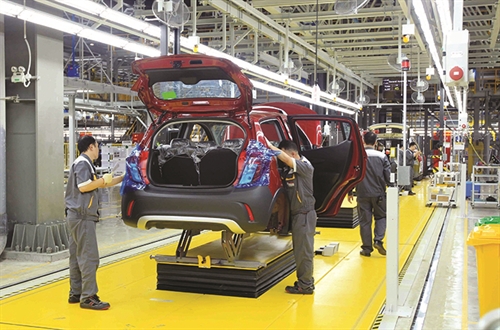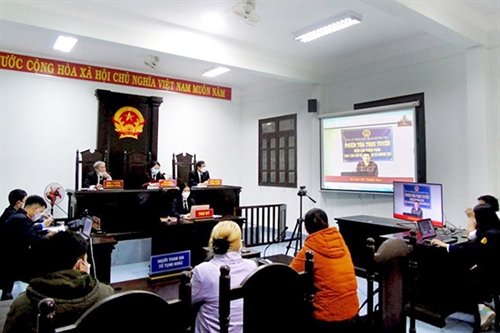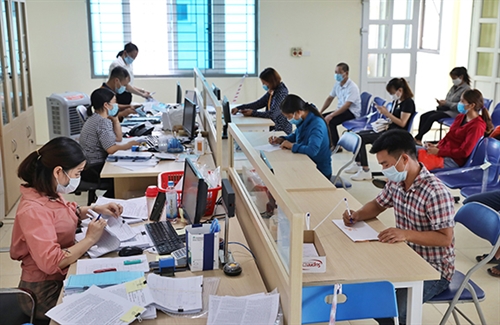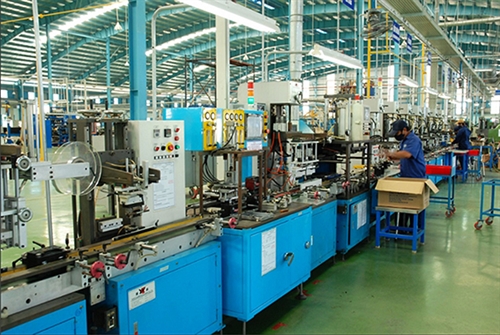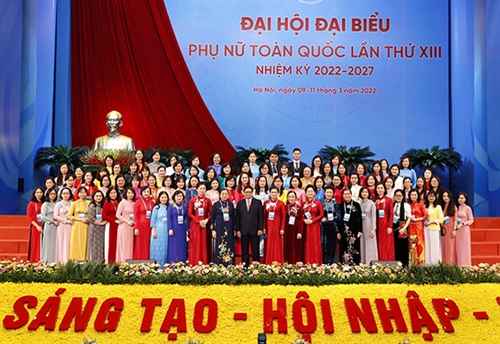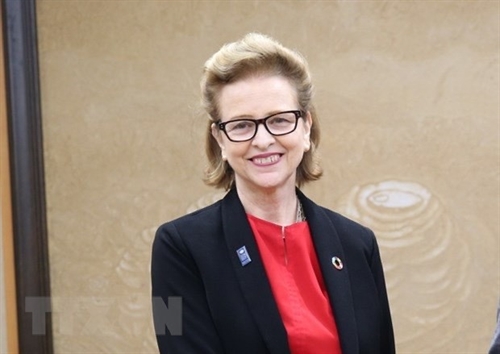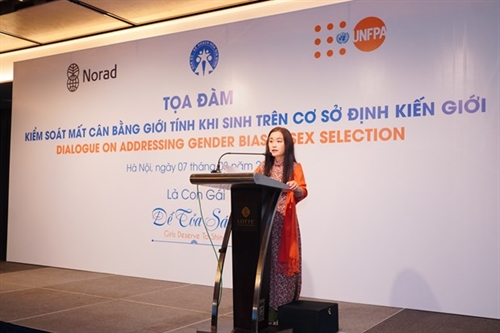Since early 2020, the complicated situation of the COVID-19 pandemic has severely affected the nation’s economy as well as many aspects of life and society. To address this, from April 2020 to July 2021, the Government rolled out several fiscal and monetary policies to help stabilize the national economy and ensure social security for the people.
Against that backdrop, the National Assembly (NA) on January 11 this year adopted Resolution 43 providing a number of fiscal and monetary policies to support the socio-economic recovery and development program.
In light of the NA’s Resolution, the Government issued Resolution 11/NQ-CP at the end of January, focusing on recovering and developing production and business activities and maintaining growth motivations with priorities given to certain fields and sectors.
Later on, the Prime Minister signed two Official Telegraphs 126/CD-TTg and 252/CD-TTg in February and March, urging related agencies, sectors and localities to resolutely and efficiently implement the program set forth in the NA’s Resolution 43 and Government’s Resolution 11/NQ-CP.
The drastic direction and administration by the Government have helped step up the implementation of important policies proposed by the NA.
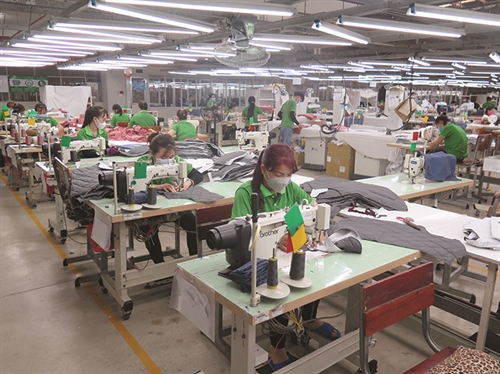 |
Producing garments at Tainan Enterprises (Vietnam) Co. Ltd., which has resumed full operation after months of COVID-19__Photo: Minh Hung/VNA |
Fiscal and monetary policies
Tax incentives
On February 1 this year, the Government issued Decree 15, guiding in detail a number of tax reduction or exemption policies under Resolution 43.
Specifically, business establishments that pay value-added tax (VAT) by the credit method will enjoy the VAT rate of 8 percent for goods and services currently liable to the tax rate of 10 percent, except telecommunications, finance and banking activities, securities, insurance, real estate business, metal and precast metal products, mining products, coke, refined oil, chemical products, and information technology products and services; and those liable to excise tax.
Meanwhile, those paying VAT based on percentage of their turnover are entitled to a 20 percent reduction of that percentage when issuing invoices for goods and services eligible for VAT reduction.
Decree 15 also provides that enterprises and organizations being corporate income tax payers as defined by the Law on Enterprise Income Tax may account their expenses for the provision of financial aid for COVID-19 prevention and control in Vietnam to pandemic-affected units as deductible expenses for determination of taxable income of the 2022 corporate income tax period.
As per Resolution 11/NQ-CP, the 30 percent reduction of land and water surface rentals will be applicable to organizations, units, enterprises, households and individuals that have to suspend their operations due to the COVID-19 pandemic and are directly leased land by the State in the form of land rent with annual rental payment under decisions, contracts or certificates of land use rights and house and land-attached asset ownership issued, signed or granted by a competent state agency.
As for extension of tax payment deadlines, Resolution 11 allows corporate income tax, personal income tax, VAT, excise tax and land rental in 2022 to be paid beyond previously set deadlines under the relevant decrees that came into force in 2020 and 2021 for those affected by the COVID-19 pandemic.
Also, those engaged in domestically manufacturing or assembling automobiles will enjoy longer excise tax payment time limits.
To concretize the aforementioned policies, the Government is gathering opinions on several draft decrees that are expected to help rehabilitate production and business activities and boost import and export within this year.
Credit policies
Under Resolution 11, the subsidized interest rate of two percent per annum for a total loan amount of VND 40 trillion will be provided in 2022 and 2023 through the system of commercial banks to enterprises, cooperatives and business households capable of loan repayment and recovery in such sectors and fields as aviation, transportation, warehousing, tourism, accommodation and catering services, education and training, agriculture, forestry and fishery, processing industry, manufacturing, software, computer programming and information services; and for loans to be provided for renovation of old condominiums and building of social houses and houses for purchase, rent or rent-purchase by workers.
At the same time, the ratio of short-term funding amounts used for providing medium- or long-term loans will be kept stable, compulsory reserves of banks will be calculated reasonably, open market and refinancing operations will be intensified, and banks’ operation costs will be reduced so as to reduce lending interest rates by 0.5-1 percent for 2022 and 2023, especially for prioritized sectors.
Banks will also continue to reschedule loan repayment terms, reduce interest rates and keep debt groups unchanged for customers affected by the COVID-19 pandemic.
Institutional and administrative reforms
According to economic experts, fiscal and monetary policies are effective tools for enterprises to survive the pandemic. However, they are not enough to enable them to resurge. For long-term development, the Government needs to continue piloting non-financial mechanisms and policies and implementing institutional reforms to strengthen the resilience of enterprises and the economy to revive.
That’s why Resolution 11 requests review and removal of barriers in institutions, mechanisms, policies and laws that hinder production and business activities; accelerated reduction and simplification of administrative procedures and improvement of the business environment; intensified online processing of administrative procedures; implementation of breakthrough solutions to promote innovation; intensified digital transformation; development of digital economy, green economy and circular economy associated with sustainable development; and removal of difficulties and obstacles posed by mechanisms, policies, laws and master plans related to land areas for building social houses and workers’ houses.
It is necessary to administer in a synchronous and flexible manner monetary policy instruments in close association with fiscal policies and other macro-economy policies to facilitate the country’s socio-economic recovery and development, taking into account inflation risks and maintaining the macro-economic stability and safety of the credit institution system.
In addition, it is important to closely monitor macro-indicators so as to have timely solutions to ensure macro-economic stability and major balances, paying greater attention to inflation and bad debt indicators; and strive for increasing revenues, saving expenses and reducing over-spending to achieve the targets set forth in the plan on national finance and public borrowing and debt payment during 2021-25.
In the speech at the high-level session of the Annual Vietnam Business Forum held on February, President of the Vietnam Chamber of Commerce and Industry (VCCI) Pham Tan Cong said this year is likely to be another challenging year for Vietnam, which requires more practical and economical solutions so as to achieve the GDP growth target of 6-6.5 percent.
He also stressed the important role of the Government and relevant agencies in consulting in a regular manner businesses and trade associations of supporting policies and regulations during the reforming process so as for them to gain easier access to the support.
According to the 2022 Asian Development Outlook, the Vietnam’s economy is expected to grow 6.5 percent this year, and 6.7 percent in 2023 on the back of the high vaccination rate, promotion of trade activities and effective fiscal and monetary policies.-
